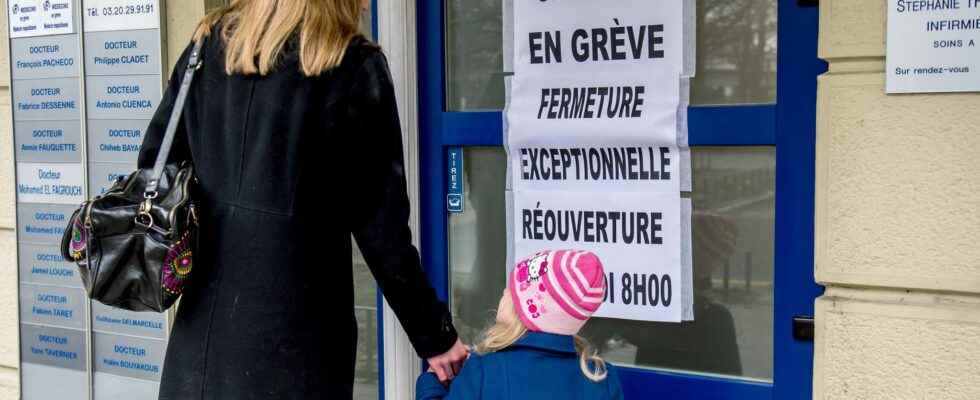After the SNCF, which saw thousands of controllers go on strike for Christmas, it is the turn of general medicine to have its informal collective from social networks. The latter, called “Doctors for tomorrow”, was set up at the end of the summer via Facebook by a handful of general practitioners angry at the deterioration of the conditions of practice of city medicine.
“We can no longer keep up, we work like crazy, 55 hours a week on average”, alert on TF1, Céline Bretelle, general practitioner and Île-de-France spokesperson for the collective. We don’t have the means and we can’t take care of patients in this context”. In four months, the collective, which calls itself “non-union and apolitical”, has brought together nearly 20,000 members, general practitioners and specialists ( pediatricians, rheumatologists, dermatologists, endocrinologists, etc.).
Create an “attractiveness shock”
Their main demand is the increase in the price of consultation (from 25 to 50 euros), all specialties combined – a measure supported by approved sector 2 practitioners, who can already invoice their consultation beyond – with the aim of creating a “shock of attractiveness” towards a city medicine in dire need of staff, crushed by administrative tasks and which no longer attracts young people. Doctors’ organizations are also concerned about their freedom of establishment, challenged by proposed medical deserts laws, and fear that other caregivers may be allowed to prescribe, including advanced practice nurses (APNs). .
On the strength of this provided base, united by a common fed up, “Doctors for tomorrow” signed a first coup at the beginning of December by calling for a strike by liberal doctors which resulted in a 30% drop in activity. in the profession according to the health insurance. The collective has rallied to its cause several unions anxious not to cut themselves off from their base, such as the UFML and the FMF, which have even given it a place at the table of discussions with the “Sécu”.
“We have young people who take ten years to be trained, ten years to settle, the profession has been made so unattractive. And we already have a profession with people 55 years old on average and those who arrive at the end of their exercise are not replaced”, maintains Jérôme Marty, president of the UFML union. On the other hand, the main unions (MG France, CSMF, Avenir Spé) consider that the open discussions this fall have produced “advances” and have not called for the cabinets to be closed during the holidays. The Minister of Health, François Braun, hailed their “responsibility”, given the “critical situation” of hospital emergencies.
“The ultimate cry of alarm”
The authorities’ call for a “sacred union” of health professionals, in the hope of “relieving” hospitals overwhelmed by the “triple epidemic” of Covid, bronchiolitis and influenza, did not make “Doctors for tomorrow”. A new strike was started on December 26 and has been extended until January 8. “This is the ultimate cry of alarm from liberal doctors in the face of the collapse of the health system as a whole”, explained Noëlle Cariclet, psychiatrist from the Ile-de-France region and spokesperson for the collective, on December 26. on franceinfolamenting that practitioners are “forced to close their offices to be heard”.
“The government unfortunately did not deign to pay attention to us despite this first week of strike. On the contrary, we were even unfairly lectured by our minister”, justifies the collective in a press release. Christelle Audigier, Lyon general practitioner and founder of “Doctors for tomorrow”, predicts however that the mobilization “will be a little less, but despite everything substantial”, while projecting towards a national demonstration planned in Paris on January 5 at 1 p.m., at the departure from the Place du Panthéon towards the Ministry of Health.
“It seems to me a very bad time not to respond to the healthcare needs of the population”, for her part, argued the director general of the Regional Health Agency (ARS) Île-de-France, Amélie Verdier. which, like the other ARS, will be able to requisition strikers to ensure night and weekend guards. The calendar chosen by the strikers is not random. The movement indeed occurs at a key moment, in the midst of negotiations between union representatives and Health Insurance on the future medical convention – which establishes for five years the links between Health Insurance and doctors, in particular the price of consultations.
